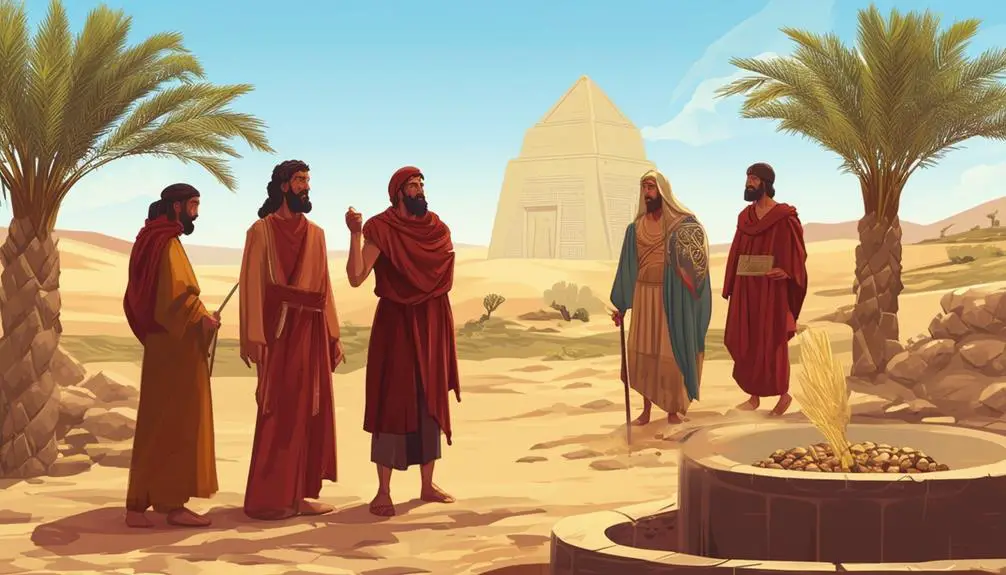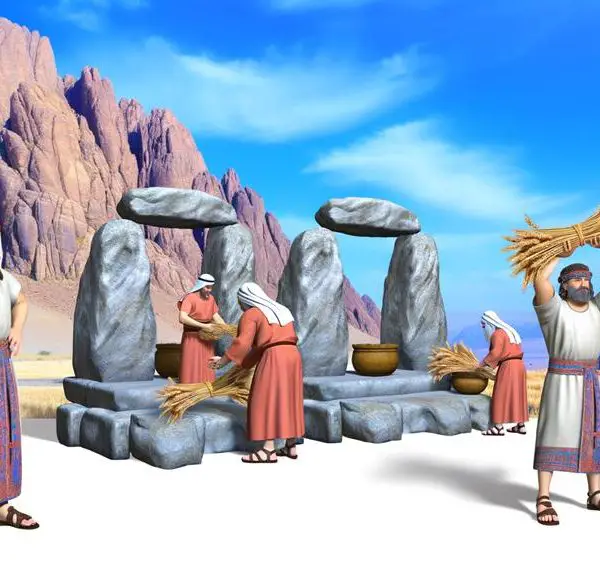Take a deep dive into Genesis 26, exploring Isaac's faith journey, divine guidance, and the symbolism of wells in this insightful Bible study.

Bible Study – The Book of Genesis – Chapter 26 – Summary and Analysis
In Genesis 26, you'll find Isaac's faith journey intricately tied to his father, Abraham's legacy. Isaac's encounters, including deceiving Abimelech and reopening Abraham's wells, reveal both his human frailty and divine protection. Pivotal events highlight themes of divine guidance, faithful obedience, and the ongoing covenant promise. The chapter's symbolism, embodied by wells, represents spiritual life and blessings, while the complex character interplay further enriches the narrative. This insightful study uncovers timeless wisdom that can guide you through life's complexities. Delving further, you'll uncover the layers of this significant biblical chapter.
Key Takeaways
- Genesis 26 highlights Isaac's faith journey, demonstrating his divine guidance and faithful obedience amidst trials.
- The chapter showcases Isaac's deceptive tactics with Abimelech, leading to a strategic alliance for peace and goodwill.
- Wells, symbolizing spiritual life and God's provision, play a significant role as Isaac reclaims his spiritual heritage by reopening Abraham's wells.
- God's covenant renewal with Isaac emphasizes divine commitment and continuity of promises from Abraham to Isaac, shaping Isaac's subsequent actions.
- The narrative provides timeless wisdom on resolving conflicts, establishing peaceful coexistence, and trusting in divine providence through life's complexities.
Context of Genesis Chapter 26

Often overlooked, the context of Genesis Chapter 26 is essential to understanding the narrative, as it provides key insights into the cultural and historical circumstances that shaped the events and characters within it. This Genesis contextualization reveals not only the socio-political dynamics of the time but also the spiritual lessons embedded within the text.
The significance of this chapter lies in its framing of Isaac's story within the broader Abrahamic narrative. You'll see how Isaac, much like his father Abraham, navigates a world rife with conflict and scarcity, embodying the virtues of faith, patience, and resilience. This chapter's context provides a window into the complex relationships between various tribes and the delicate balance of power in the ancient Near East.
You shouldn't underestimate the chapter's significance; it's more than just a historical account. It serves as a spiritual guide, offering insights into human behavior, divine intervention, and the consequences of our actions. So, as you explore further into Genesis 26, remember to take its context into account. Understanding the cultural, political, and religious backdrop will give you a richer, more nuanced understanding of the chapter's events and characters.
Detailed Summary of Genesis 26
Let's now turn our attention to a detailed examination of Genesis 26, particularly focusing on Isaac's narrative and his covenant with Abimelech. You'll find that the careful analysis of these episodes provides a deeper understanding of the biblical text's richness and complexity. Remember, your purpose here is to dissect the text, uncover its layers, and understand its implications in a broader religious and historical context.
Isaac's Story Unfolds
Delving into Genesis 26, you'll uncover the intricate narrative of Isaac, whose story unfolds with a remarkable blend of faith, familial relationships, and divine intervention. Isaac's faith is palpable; he leans heavily on his paternal legacy, the covenant God made with Abraham.
In this chapter, you'll find:
- Isaac's encounter with God, where God reiterates His covenant, promising blessings and numerous descendants. Isaac's faith, despite famine and hardship, is unwavering.
- His deception of Abimelech, echoing a similar event in Abraham's life, suggesting a familial disposition to preserve self above all.
- The reopening of Abraham's wells, symbolizing Isaac's continuation of his father's legacy.
- Lastly, Isaac's conflict with the Philistines, an example of the challenges that tested his faith and resilience.
Isaac, in Genesis 26, exemplifies the complex interplay of faith, legacy, and divine promises.
Abimelech's Covenant
In Genesis 26, you'll see how Isaac, maneuvering through a complex web of societal and personal challenges, enters into a covenant with Abimelech, a significant turn of events that underscores the dynamics between faith, diplomacy, and survival. Abimelech, a Philistine King, recognizes Isaac's prosperity and the favor of God upon him. Driven by fear and respect, King Abimelech initiates peaceful negotiations. He believes, rightly so, that maintaining a positive and non-confrontational relationship with Isaac would be beneficial.
These negotiations culminate in a covenant, a mutual agreement ensuring peace and goodwill between them. This covenant is not just a pact but a strategic alliance, a testimony to Isaac's diplomatic acumen. It also serves as a reminder of God's divine protection and guidance amidst adversity.
Characters in Genesis Chapter 26

Examining the array of characters in Genesis Chapter 26, you'll find a rich tapestry of personalities that contribute to the narrative's depth and complexity. The key figures in this chapter, namely Isaac, Rebekah, Abimelech, and the Philistines, all play important roles in shaping the narrative, particularly in the context of 'Isaac's Legacy' and 'Rebekah's Influence'.
- Isaac: He's the central character whose actions and decisions largely drive the narrative. He is a reflection of his father Abraham's virtues and his legacy is established through his obedience to God and his commitment to his family.
- Rebekah: As Isaac's wife, she exerts considerable influence over the family's dynamics. Despite her less prominent role in this chapter, her decisions and support are vital to Isaac's success.
- Abimelech: The King of the Philistines, he represents the external challenges that Isaac and Rebekah face. His interactions with Isaac bring forth the themes of conflict, diplomacy, and resolution.
- The Philistines: They symbolize the broader societal and cultural context in which Isaac and Rebekah navigate. Their attitudes and actions towards Isaac and his family provide insight into the prevailing societal norms and values of the time.
Each character importantly contributes to the unfolding drama, adding layers of complexity and intrigue to the narrative.
Key Events Analysis
In examining the key events in Genesis Chapter 26, you'll find Isaac's deceptive tactics and God's covenant renewal commanding your attention. Isaac's actions provide an intriguing study of character motivation and consequences while God's reaffirmation of His covenant yields profound theological implications. Let's turn a critical eye to these pivotal moments, dissecting their significance within the narrative and their broader spiritual implications.
Isaacs Deceptive Tactics
Diving into Isaac's deceptive tactics, you'll find an intriguing web of deceit and manipulation, intricately woven throughout Genesis chapter 26. It's clear that Isaac's motivations and deceptive strategy were driven by a number of factors, which we will explore:
- Fear for personal safety: Isaac lied about his wife Rebekah being his sister, a deceit reminiscent of Abraham's actions with Sarah.
- Desire for prosperity: Isaac's duplicity led to increased wealth, as Abimelech's people refrained from harming him or Rebekah.
- The need to secure God's promise: Isaac's actions can be interpreted as attempts to protect the lineage through which God's promise would be fulfilled.
- Lack of faith in God's protection: Despite God's assurances, Isaac chose human strategy over divine protection.
Despite these tactics, Isaac's story is a testimony to God's faithfulness, even in human failure.
Gods Covenant Renewal
Let's explore the pivotal renewal of God's covenant with Isaac, a significant event that underscores divine fidelity and commitment in Genesis chapter 26. This act of Covenant renewal is an affirmation of divine assurance. God's reaffirmation to Isaac, echoing the Covenant promises made to his father Abraham, is essential. This continuity of God's faithfulness, despite Isaac's human frailty, is profound. It's a divine commitment, transcending generations, connecting Abraham, Isaac, and eventually Jacob. It emphasises that God's promises are irrevocable. Isaac, reassured by the unchanging nature of God's Covenant promises, is motivated to build an altar and settle in Beersheba. The renewal of the Covenant not only reinforces divine assurance but also shapes Isaac's actions and decisions subsequently.
Symbolism in Genesis 26

Peeling back the layers of Genesis 26, you'll find a rich tapestry of symbolism woven into the narrative. This chapter, rife with symbolic wells and testimonials of Isaac's faithfulness, sheds light on the profound spiritual truths embedded in everyday occurrences.
- Isaac's Faithfulness: Isaac's unwavering trust in God symbolizes the robustness of faith. Despite the famine, Isaac remains in Gerar as instructed by God. His obedience reflects the believer's call to remain faithful even in adversity.
- Symbolic Wells: The wells in Genesis 26 are rich in symbolism. They represent spiritual life and blessing. Remember, wells provide water, a life-sustaining element, symbolizing God's provision and blessing.
- Reopening of Abraham's Wells: Isaac's reopening of the wells his father Abraham had dug symbolizes the reclamation of spiritual heritage. It's a call to remember and uphold the faith of our predecessors.
- Naming of the Wells: The naming of the wells signifies ownership and authority. Isaac's assertion of this right, despite opposition, underscores the believer's rightful claim to God's promises.
Theological Implications
In examining the theological implications of Genesis 26, you'll find it's a chapter that not only deepens our understanding of Isaac's faith journey, but also informs us about the nature of God's covenant promise and our role in it. Specifically, the themes of Divine Guidance and Faithful Obedience are prominent.
We see Isaac, following Divine Guidance, navigate through various trials, resembling Abraham's journey yet distinct in its own right. His Faithful Obedience is evident when he chooses not to retaliate against the Philistines and trust in God's plan instead.
To further illustrate, consider this table:
Event |
Divine Guidance |
Faithful Obedience |
|---|---|---|
Isaac dwells in Gerar |
God directs Isaac to stay in Gerar, not Egypt |
Isaac obeys God's command |
Dispute over wells |
God reassures Isaac of His protection |
Isaac demonstrates patience and restraint |
Treaty with Abimelech |
God aids Isaac in gaining Abimelech's respect |
Isaac keeps peace, in obedience to God |
Prosperity of Isaac |
Blessings as a result of Divine Guidance |
God rewards Isaac's obedience |
Renewal of Covenant |
God reaffirms His promise |
Isaac accepts the promise faithfully |
Herein lies the theological implications: our decisions, guided by God, coupled with faithful obedience, shape our faith journeys.
Chapter 26's Relevance Today

One might question: what relevance does Genesis Chapter 26 have in our lives today? Despite being written centuries ago, its lessons bear a profound Modern Relevance. Here are four ways in which this chapter's Scriptural Applications are still relevant today:
- The story of Isaac reaping a hundredfold in the same year he sowed (verse 12) resonates with the belief in divine providence and rewards for hard work. It serves as a reminder that with faith and diligence, you can overcome challenges and prosper.
- Isaac's peace-making strategies in handling disputes over wells (verses 17-22) demonstrate the importance of conflict resolution, a skill vital in our personal and professional lives.
- God's reassurance to Isaac, 'Do not be afraid, for I am with you' (verse 24), comforts us amidst life's uncertainties, reminding us of God's constant presence and care.
- Finally, the Abimelech-Isaac treaty (verses 26-31) underscores the importance of establishing peaceful coexistence and mutual respect in a diverse society.
Thus, Genesis 26 isn't just historical narrative; its timeless wisdom continues to guide us in maneuvering life's complexities.
Frequently Asked Questions
What Are Some Study Methods Suitable for Understanding Genesis Chapter 26?
You'd find character analysis and thematic exploration useful for understanding Genesis 26. Keep a journal for notes on characters' actions and motivations. Explore themes like faith, obedience, and God's promise. Use cross-references to connect events and concepts. Don't forget to study historical and cultural contexts. Finally, discussing your insights in a group can deepen your comprehension. You'll gain fresh perspectives and it'll stimulate robust discussions.
How Does Chapter 26 Relate to Other Chapters in the Book of Genesis?
Chapter 26 of Genesis isn't an isolated story. It's intertwined with the rest of the book, especially through Isaac's blessings. In fact, they echo the promises God made to Abraham in earlier chapters. Plus, Abimelech's Treaty showcases recurring themes of peace and divine providence. So, when you're reading Genesis, you're not just exploring separate tales, you're diving into an interconnected narrative where each chapter enriches and expands on the others.
Are There Any Controversies or Debates Surrounding Genesis Chapter 26?
Yes, there are debates about Genesis 26, particularly around Isaac's blessings and Rebekah's plotting. Some argue that Isaac's blessings were manipulated, others that Rebekah's actions were divinely inspired. It's a matter of interpretation, and your perspective might depend on your faith and understanding of biblical narratives. Always question and explore these controversies to deepen your understanding of this complex and intriguing chapter.
What Are the Main Interpretations of Genesis Chapter 26 by Different Denominations?
You're diving into Genesis 26, huh? Well, interpretations vary. Some focus on Isaac's obedience to God as a model for their faith. Others highlight Abimelech's treaty with Isaac, showing how diplomacy can solve conflicts. Remember, interpretations can be influenced by denominational beliefs, so always approach with an open mind. These key elements, Isaac's obedience and Abimelech's treaty, can provide a rich understanding of this chapter.
How Have Perspectives on Genesis Chapter 26 Evolved Over Time?
Over time, your understanding of Genesis chapter 26 can change due to cultural context and historical analysis. It's not static; interpretations evolve as society does. Scholars may emphasize different aspects based on current events or cultural shifts. So, you're not just reading an ancient text, but a living document that continues to reveal new insights. It's important to keep this in mind when studying the Bible, as it enriches your understanding.



Sign up